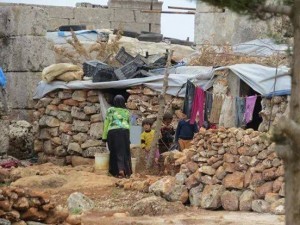Repeated Displacement from Northwest Syrian Town

As Kafrouma becomes a battleground, waves of civilians seek refuge in neighbouring towns and villages.
Abdallah Kleido
Um Mohammad, 50 sits in front of a sewer opening, the only place her family has found to live. From there, she looks towards her home town of Kafrouma, only six kilometres away, and sighs.

Her husband died in an artillery bombardment, so she is here with her two daughters and her son.
“How can you expect me not to be here? Look at the smoke rising from the town. The planes never stop flying overhead,” she said. “No one will take us in without expecting something in return. We can’t even find a place to live in [abandoned] historical villages any more.”
Kafrouma is a town of approximately 18,000 residents to the west of Maarat al-Numan, a city in the south of Idlib province.
Syrian rebel forces have engaged in five battles against government army outposts at Wadi al-Dayf and Hamidiyya, near Kafrouma. These battles last from a couple of days to two weeks, without victory for either side.
In the most recent engagements in July and August, Kafrouma was shelled because rebel attacks were launched from there.
Each new battle prompted Kafrouma residents to seek shelter in neighbouring towns, or in the “dead cities” – long-abandoned ancient villages like Shamshirah.
When civilians fled Kafrouma during fighting in summer 2012, they were welcomed in neighbouring areas. That hospitable mood has since faded. Property rents have spiraled to 150 to 200 US dollars a month, too much for people like Um Mohammad.
Hamdu al-Satayf, a former head of the Kfar Nabel Aid Committee, says the high rents reflect deteriorating economic circumstances. People who might once have provided shelter for nothing are now renting out their homes to boost their incomes.
According to Mohammad Kheir al-Shartah, head of the Local Coordination Committee (LCC), “Most if not all these families have gone to camps in Turkey. They live on Turkish government aid and rent out their homes for exorbitant amounts of money.”
Ahmad al-Nadim, a former aid worker in Kfar Nabel, says claims that refugees abused the hospitality they were given made the locals less welcoming.
“All the families would take them in for free, but with the ongoing war and complaints of thefts from houses, they now refuse to accommodate displaced people,” he said.
Abdel Rahman al-Rahmun, deputy head of the LCC, says such claims are unfair.
“In such conditions of chaos, thefts can happen, but they are rare, and the problem can be resolved in a more productive way,” he said. “Displaced people shouldn’t have to pay for the actions of a few.”
Abdu al-Rahmun, a member of the Suqur al-Sham rebel group, accuses local traders of exploiting the refugees. He recalls going to a village shop where he was charged much more for vegetables than the woman who was served just before him.
“Even the schools won’t accept us any more,” said Ibrahim al-Taher, a combatant in another group, the Fajr al-Islam Brigade. “When I tried to take my family to a school in the village of Ftira, they refused to let us in because the head didn’t want displaced families there, as he plays volleyball there at night.”
The school head denied selfish motives, saying that instead, “We’ve had experiences with displaced families recently. We took them into our schools over the summer holiday, but they refused to leave when the schools reopened. As a result, many pupils were unable to study.”
The LCC is finding it difficult to manage aid and water provision to Kafrouma residents who are dispersed across the area. Its head, Shartah, said it had limited capacity to round them up and bring them in to more central locations.
In the “dead cities”, displaced people from Kafrouma are short of water and electricity, and live either in ancient buildings covered in plastic sheeting or out in the open.
“It’s better here, it’s OK,” said Abu Rashad, 40. “At least no one here kicks you out of their house because you aren’t paying rent, and you don’t get ejected from schools.”
When the latest bout of fighting ended on August 30, Um Mohammad went home to Kafrouma.
“The battle is over but our houses are constantly at risk of being shelled. They have achieve nothing except piling up more bodies and wreaking more destruction,” she said. “I no longer want war. I no longer want liberation.”
Abdallah Kleido is a reporter in Syria.
